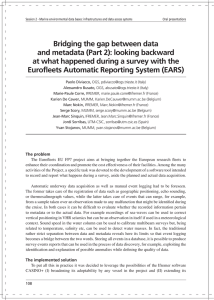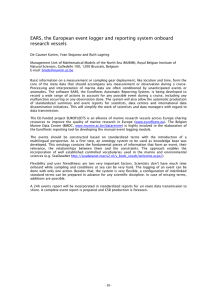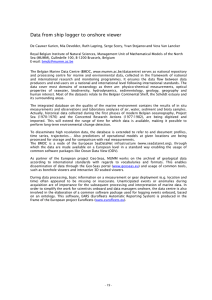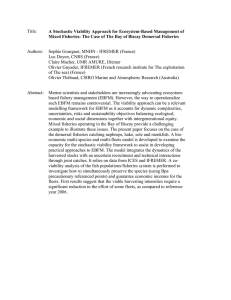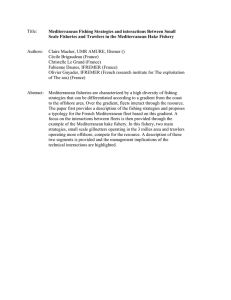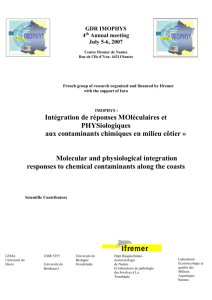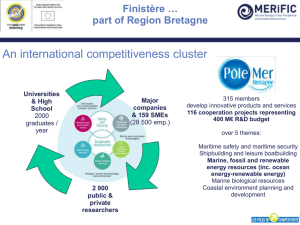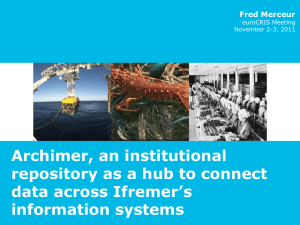Document 11681237
advertisement
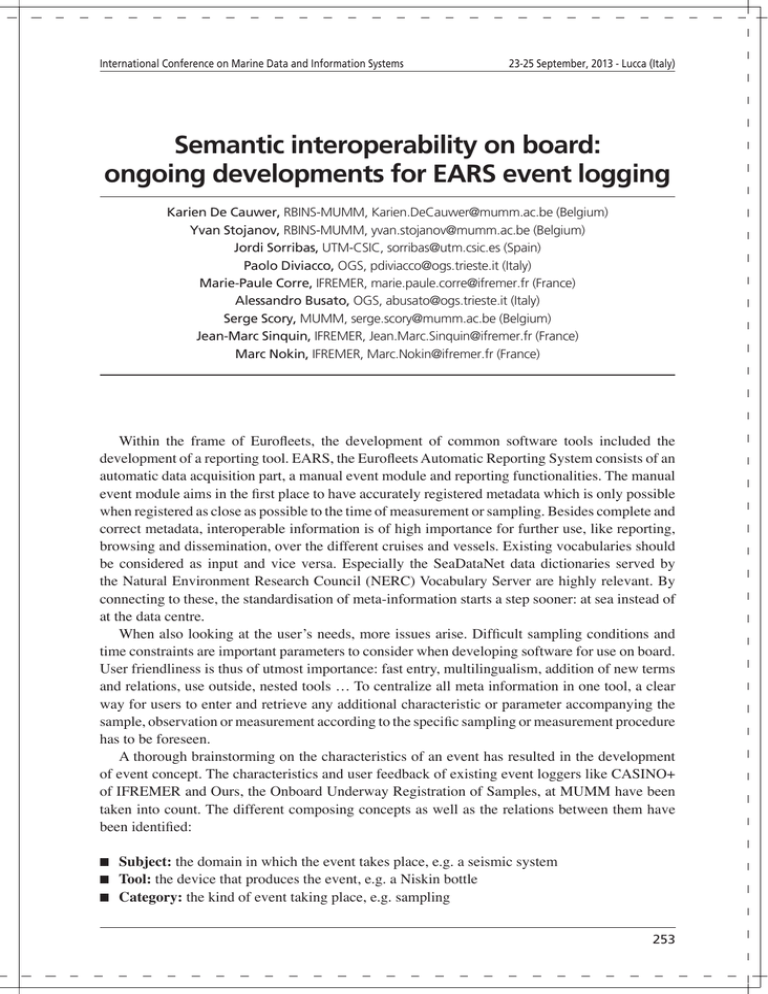
International Conference on Marine Data and Information Systems 23-25 September, 2013 - Lucca (Italy) Semantic interoperability on board: ongoing developments for EARS event logging Karien De Cauwer, RBINS-MUMM, Karien.DeCauwer@mumm.ac.be (Belgium) Yvan Stojanov, RBINS-MUMM, yvan.stojanov@mumm.ac.be (Belgium) Jordi Sorribas, UTM-CSIC, sorribas@utm.csic.es (Spain) Paolo Diviacco, OGS, pdiviacco@ogs.trieste.it (Italy) Marie-Paule Corre, IFREMER, marie.paule.corre@ifremer.fr (France) Alessandro Busato, OGS, abusato@ogs.trieste.it (Italy) Serge Scory, MUMM, serge.scory@mumm.ac.be (Belgium) Jean-Marc Sinquin, IFREMER, Jean.Marc.Sinquin@ifremer.fr (France) Marc Nokin, IFREMER, Marc.Nokin@ifremer.fr (France) Within the frame of Eurofleets, the development of common software tools included the development of a reporting tool. EARS, the Eurofleets Automatic Reporting System consists of an automatic data acquisition part, a manual event module and reporting functionalities. The manual event module aims in the first place to have accurately registered metadata which is only possible when registered as close as possible to the time of measurement or sampling. Besides complete and correct metadata, interoperable information is of high importance for further use, like reporting, browsing and dissemination, over the different cruises and vessels. Existing vocabularies should be considered as input and vice versa. Especially the SeaDataNet data dictionaries served by the Natural Environment Research Council (NERC) Vocabulary Server are highly relevant. By connecting to these, the standardisation of meta-information starts a step sooner: at sea instead of at the data centre. When also looking at the user’s needs, more issues arise. Difficult sampling conditions and time constraints are important parameters to consider when developing software for use on board. User friendliness is thus of utmost importance: fast entry, multilingualism, addition of new terms and relations, use outside, nested tools … To centralize all meta information in one tool, a clear way for users to enter and retrieve any additional characteristic or parameter accompanying the sample, observation or measurement according to the specific sampling or measurement procedure has to be foreseen. A thorough brainstorming on the characteristics of an event has resulted in the development of event concept. The characteristics and user feedback of existing event loggers like CASINO+ of IFREMER and Ours, the Onboard Underway Registration of Samples, at MUMM have been taken into count. The different composing concepts as well as the relations between them have been identified: ■ Subject: the domain in which the event takes place, e.g. a seismic system ■ Tool: the device that produces the event, e.g. a Niskin bottle ■ Category: the kind of event taking place, e.g. sampling 253 Session 3 - Data Services in ocean science Posters ■ Action: the actual task performed, e.g. close bottle a free text field that is left to the operator to enter more information ■ Actor: the person performing the action ■ Action_property: any additional characteristic or parameter accompanying a given action for which the user needs to enter a value onboard f.e. volume of water centrifuged. ■ Comment: Commonality between these concepts and existing vocabularies has been identified. In particular, the SeaDatanet L05 SeaDataNet device categories can be referred to for ‘Subject’, while the L221 Seavox device catalogue provides a good list of measurement devices for the ‘Tool’. Having events built over the combination of parts, allow high levels of flexibility but at the same time introduces the risk to get far from the actual acquisition practices. In order to avoid errors and at the same time increase user friendliness, it is very important to introduce a mechanism that can constrain choices upon knowledge and existing practices. The relations between the instances of different concepts are thus important. At the start of Eurofleets 1, ‘Action’ terms have been defined for different tools and disciplines but it was obvious that all aspects of all disciplines could not be covered since the start. A flexible approach was chosen to prevent users being blocked during the survey. EARS Version 1 is built in such a way that relationships between terms are being created by scientific experts creating their personal and discipline-specific configuration tree. New terms can be easily added. After that, an event is generated by one doubleclick or drag-and-drop. In fact, an ontological instance is being created during the logging of information. The ontology implementation for the event logger will enable the reference to existing controlled vocabularies or taxonomies as well as the usage and sharing of relations between terms as for example the possible actions with a given tool. A leap forward is ongoing within Eurofleets 2 through the full integration of the ontology. The so-far logged events are being gathered in an extended event ontology in which terms and relations of existing vocabularies are sourced from their originating namespace. As following step, the user interface to enter manual events will be adapted to be based on RDF files (SKOS, OWL) and SPARQL queries. In order to manage the terms, a governance scheme will be implemented in close collaboration with SeaDataNet. New terms are to be expected as input for the NERC Vocabulary Server catalogues. Any additional list, relations between terms and commonly used local names will be served by a Eurofleets ontological server and SPARQL endpoint for use within the tool and for browsing linked event information. Contacts and concrete actions are defined to harmonise and establish a common governance beyond the EU within the ODIP project. 254
